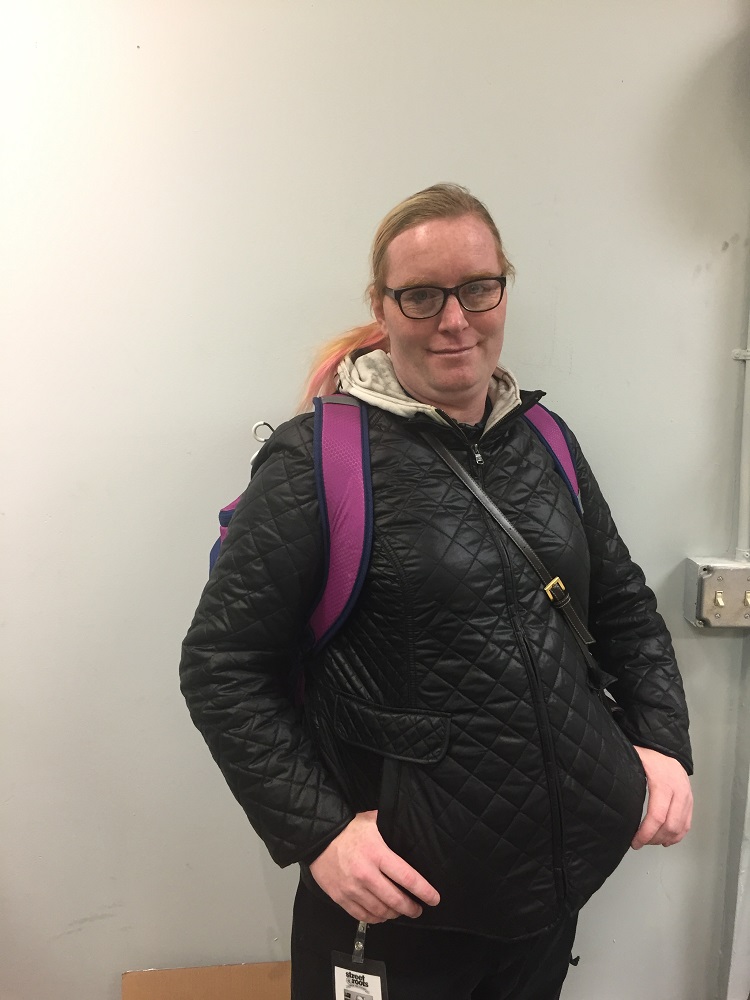By Sophie Ouellette-Howitz, Street Roots
Tina Rayeanne Drake adds sugar and milk to her coffee cup first, then pours in steaming hot liquid from the carafe. In this, as in all she does, she acts with well-considered intent.
Choosing her name was no exception. “Tina, my first name, I’ve always loved,” she tells me. “Rayeanne is an extension of my mother’s middle name, Anne, and Drake is simply my favorite mythical animal.”
Drakes, for those who don’t know, are small, legless dragons with long tails and impressive wing spans. In December, this meaning-laden name became Tina’s legal name, and the gender markers on her government documents now confirm her true gender.
“It’s a wonderful, wonderful time,” she smiles. “It’s freedom from a lie I had to tell myself all my life. It literally was a weight lifted off my shoulders.”
That weight had been building for a very long time: since she was 4 or 5 years old, Tina knew there was a mismatch between her inner self and the expectations placed on her by the world she was living in.
“I was never the masculine type,” she explains. “I was always playing with my sister and with her toys, dressing up in my mother’s clothing.”

As she grew up, Tina began bringing her inner self out into the light, which led to a schism between her and her “die-hard Mormon” family.
“I was pretty much told to go to hell,” she says. “My sister flat-out told me – and it’s one of the things that made me even more determined – ‘You will never be a woman; you will simply always be a man in a dress.’”
Still, Tina holds out hope that, one day, her family will “realize the truth.”
Her arrival in Portland two and a half years ago marked a turning point in Tina’s life.
“From day one, I didn’t have to hide. I mean, the homeless shelters! If you identify as female, you can use the female shelters. That was a big thing for me – how open and inviting Portland is.”
It’s a stark contrast to Utah, the place Tina previously called home.
“It’s very anti-LGBT, anti-trans,” she admits.
In Utah, to live openly as her true self was “almost impossible,” she says. “I probably would have ended up taking my own life at some point, as a result of having to hide, or I would have been miserable all my life. Coming out here, everything has been so much better. To every other trans woman and man out there, don’t be afraid to take the steps you need to take.”
The conviction Tina needed to take those steps came from her mother, who died in 2011. She saw Tina for who she truly was and accepted her completely.
“She was everything,” Tina smiles. “I carry a small plaque that says: ‘Everything I am, I owe to my mother.’”
The bond between them was forged in the kitchen, where Tina began cooking with her mother at the age of 7.
Today, two of Tina’s biggest dreams come from her enduring love of cooking. First, she wants to travel Old Route 66 from beginning to end, trying famous dishes from the cities and states she passes through. Second, she wants to open “a bicycle pull-along style hot dog cart.” She’s already developed a menu of gourmet, experimental creations: “a pizza dog, a BLT dog, and my specialty would be a cheesesteak dog.”
Tina has calculated how much she would need to save from the money she earns selling Street Roots in order to purchase a solar-powered RV for her road trip and get her hot dog cart up and running.
“I know I can make it happen,” she says. “People talk about not having hope, but that’s the one thing that can never be taken away from you. I get that belief from my mother. She always said that you can do anything you put your mind to. No matter what, no matter how hard the obstacles are, I will find a way around. Either that, or I’ll kick that door right open and walk right through.”




















